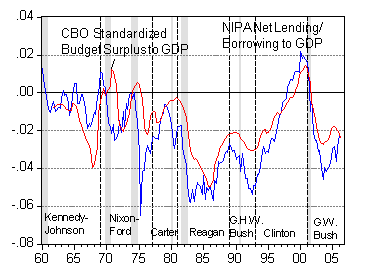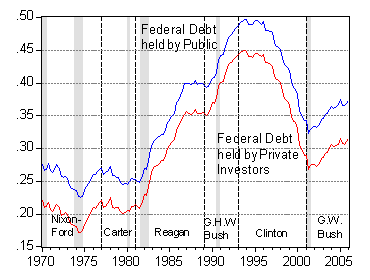Or, over the past quarter century, have Democrats and Republicans acted differently?
In comments to my previous post on whether tax receipts were surging in an unprecedented fashion, and if so, what this meant for the fiscal outlook, I was admonished for not discussing further revenue versus spending trends. In response, here are two pictures I will present without further comment, except to acknowledge intellectual property rights — Figure 1 was inspired by a similar graph by Jeff Frankel (slide 37) (my tweak is to add recession dates and a “standardized” budget balance measure — to take out cyclical effects among other things — and to subtract spending to GDP).

Figure 1: Net lending by Federal Government, and CBO standardized budget surplus, as a share of nominal GDP. Source: For net lending, NIPA Table 3.2, line 45, June 29, 2006 release; for standardized budget surplus 1962-2005, CBO, The Budget and Economic Outlook, January 2006, Appendix F, and for 2006 estimates, CBO The Cyclically Adjusted and Standardized Budget Surplus, March 2006. Fiscal year figures converted to quarterly data using a quadratic match average process which fits “…a local quadratic polynomial for each observation of the low frequency series, then use this polynomial to fill in all observations of the high frequency series associated with the period.” (EViews manual). Recession dates from NBER.

Figure 2: Federal Government debt held by public (including Federal Reserve), and by private investors, as a share of nominal GDP. Source: U.S. Treasury via St. Louis Fed FRED II. Recession dates from NBER.
Technorati Tags: href=”http://www.technorati.com/tags/budget+deficits”>budget deficits,
standardized budget balance,
Federal debt, Democrats
and
Republicans
Interesting charts. I think if you’re going to evaulate political parties, though, you also have to take into account the Congresses these Presidents had to deal with.
Nice charts!
Looks like fiscal responsibility is for suckers (from a political POW). If Clinton hadn’t done such a good job in reducing deficit, Bush would have had a much harder time to implement his tax cut for the rich. I hope all future democrats in power remember this hard lesson.
Since about 1976, when presidents lost the power to impound expenditures, the entire blame for the budget lies with congress. The more appropriate listing is not the president, but the party that controls the House of Representatives.
Neil Stevens: Good point. Although for the past four years, one party has held both houses of Congress, and the Presidency…
Scott Gustafson: I thought there was something the President has, called a veto. While he has only used it once, and then on a non-budget item, I am sure there is nothing in the Constitution that prevents him from using it to veto a spending bill. He could even propose a tax increase; if memory serves, the elder George Bush did something like that.
pat: Interesting point. But somebody has to be an adult, or the Republic goes down the drain.